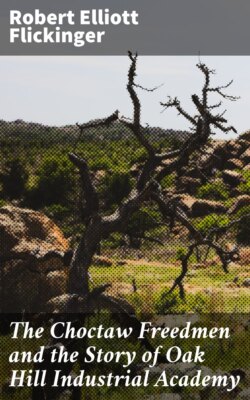Читать книгу The Choctaw Freedmen and the Story of Oak Hill Industrial Academy - Robert Elliott Flickinger - Страница 43
На сайте Литреса книга снята с продажи.
RELIGIOUS INSTINCT
ОглавлениеIn commendation of woman's loyalty and sense of obligation to our Lord Jesus, it has been said of her, "She was last at his cross and first at his grave, she staid longest there and was soonest here." In recognition of this fact when he rose from the dead he appeared first to one of them, Mary Magdalene.
To the credit of men of African descent, it may be said, that one of them performed the last act of kindness to our Lord Jesus, and the first individual conversion, of which we have an account in the book of Acts, relates to another one.
Simon, who assisted Jesus to bear his cross to the place of crucifixion, was a native of Cyrene in North Africa. The eastern church canonized him as Simon, the Black one, because his was the high and holy honor of bearing for the weary Christ, his cross of shame and pain. Our Lord Jesus was not long in the black man's debt. A few hours later, he paid it back by bearing for him all his weary burdens, on the very cross the African had borne for him. That was a good start for the Black man.
Philip, directed by an angel of the Lord to go south and join himself to the chariot occupied by the Eunuch, a man of great authority under the Queen of Ethiopia, found him reading the prophet Isaiah. Explaining the scriptures to him the eunuch confessed his faith in Jesus, was baptized with water found at the roadside and resumed his journey, homeward from Jerusalem, rejoicing. The record of this Black man's conversion is the first one of an individual in the book of Acts.
The religious trait of the American Negro has often been the subject of favorable comment. He has never, in all his history, been swayed by the false teachings of infidels, atheists or anarchists.
Dan Crawford, a Scotch missionary, the successor of Livingstone in the central part of the dark continent, recently stated he had discovered the fact, that the most ignorant and degraded natives of central Africa, have a religious instinct, that includes a belief in one God and the immortality of the soul.
Penetrating the jungles of the interior beyond the reach of a previous explorer, he found a tribe of nearly nude cannibals. He saw one of them eating human flesh. Meeting Ka la ma ta, their chief, the next day in the presence of several hundred of his tribe, he made special inquiry in regard to their knowledge of God. The result was an astounding surprise.
Kalamata, gave their name of God as Vi de Mu ku lu the Great King. When further questioned he said:
"We know there is a God for the same reason we know where the goats went on a wet night, when we see their deep foot-prints in the mud. We see the sun and the sun sees us. We see the wonderful mountains and the flowing streams, and both tell us there is a God. He is the one who sends the rain. No rain, nothing to eat; no God, no anything."
Concerning a future life he expressed the thought, the body is the cottage of the soul. The dead do not really die. When one dies they do not say, "he departed", but "he has arrived."
The American Negro, like his native ancestor, has always manifested this religious instinct.
Under the influence of a natural instinct the bee invariably builds its cell in the same form for the next brood and the storage of honey for it; the butterfly prepares the cradle and food for offspring it never sees, and the migratory birds follow the sun northward in the spring and southward on the approach of winter. All this is natural instinct.
Religious instinct is something very different from the natural instinct of any creature. It is a natural power possessed by man alone, and has its sphere in the human conscience. Paul, writing to the Romans in regard to the barbarians of his day, observed, "God is manifest in them, for the invisible things of God, even his eternal power and God-head, are clearly seen by the things that are made."
